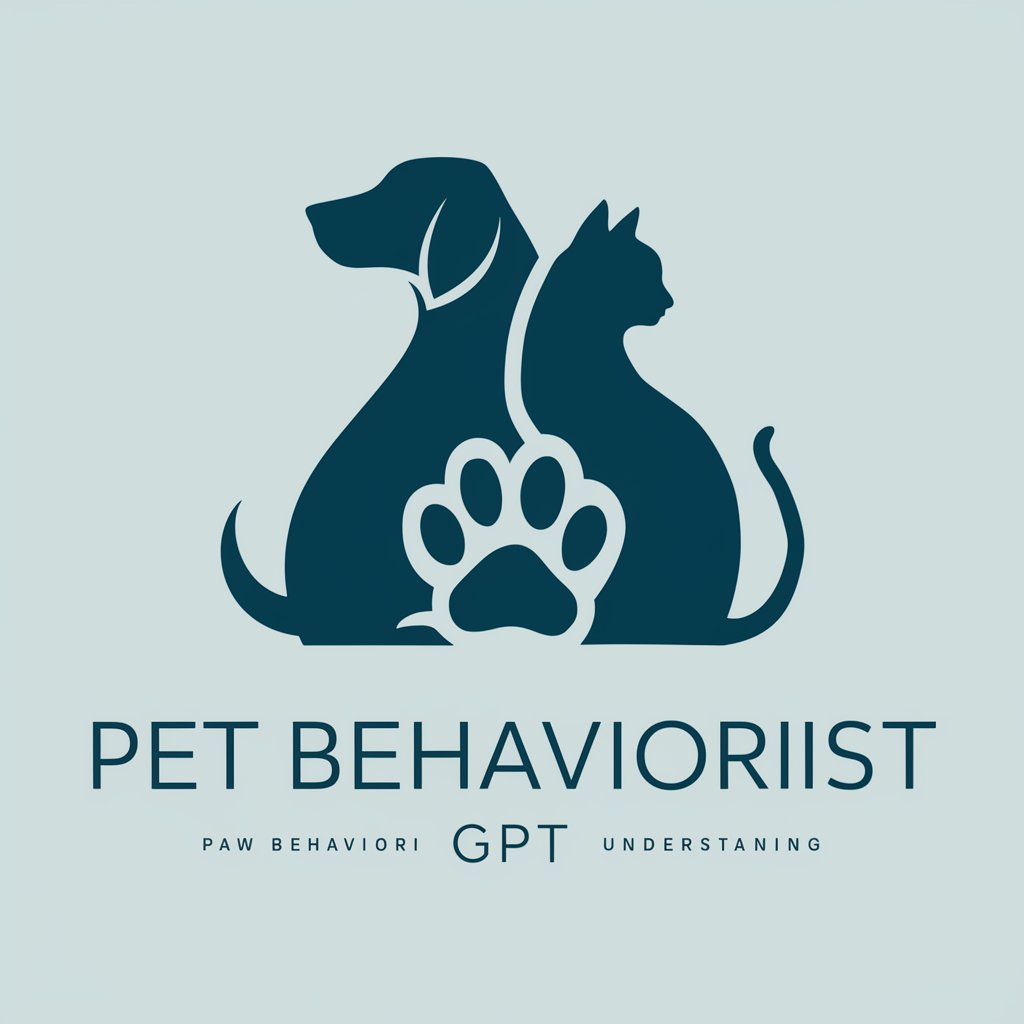Pet Behaviorist - Expert Pet Behavior Guidance

Welcome! How can I assist with your pet's behavior today?
AI-Powered Pet Behavior Solutions
How can I address my dog's separation anxiety as a Golden Retriever?
What are some training tips for my new Bengal kitten?
Can you explain the typical behaviors of a Border Collie?
What are the best ways to socialize a Shih Tzu puppy?
Get Embed Code
Overview of Pet Behaviorist
Pet Behaviorist is a specialized GPT designed to offer expert advice on pet behavior, focusing on breed-specific traits and tendencies. It provides practical training tips and techniques tailored to the pet's age, breed, and temperament. This GPT also links behavior with overall health and wellness, offering insights into how these aspects interconnect. It's equipped for interactive problem-solving, delivering customized solutions to behavioral challenges faced by pet owners and veterinarians. Pet Behaviorist is an educational resource, offering the latest insights into behavioral science. For instance, if a dog owner is struggling with their pet's separation anxiety, Pet Behaviorist can provide specific strategies based on the dog's breed, age, and the context of the behavior. Powered by ChatGPT-4o。

Core Functions of Pet Behaviorist
Behavioral Advice
Example
Offering strategies to manage a cat's nocturnal activity.
Scenario
A cat owner is puzzled by their pet's increased nighttime activity, disrupting their sleep. Pet Behaviorist can analyze the cat's breed, age, and environment to suggest tailored interventions, like interactive toys or adjusted feeding times, to help modify the cat's nocturnal behavior.
Training Tips and Techniques
Example
Guiding on positive reinforcement training for a puppy.
Scenario
A new puppy owner is struggling with basic obedience training. Pet Behaviorist can provide step-by-step guidance on positive reinforcement techniques, suitable for the puppy's breed and age, to effectively teach commands like 'sit,' 'stay,' or 'come.'
Linking Behavior with Health
Example
Exploring how a dog's sudden aggression might be health-related.
Scenario
A dog owner notices their previously friendly dog is showing signs of aggression. Pet Behaviorist can suggest possible health issues that might be influencing the behavior, advising a veterinary check-up to rule out pain or illness as underlying causes.
Target User Groups for Pet Behaviorist
Pet Owners
Pet owners, whether they're new or experienced, can benefit from Pet Behaviorist's insights into pet behavior, training, and health. The tool can assist them in understanding their pets better, resolving behavioral issues, and fostering a positive human-animal bond.
Veterinarians
Veterinarians can use Pet Behaviorist as a resource to gain additional perspectives on pet behavior, supplementing their medical expertise with behavioral insights. This can enhance their ability to provide holistic care to their animal patients.

How to Use Pet Behaviorist
1
Start by visiting yeschat.ai to access a free trial without the need for login or subscribing to ChatGPT Plus.
2
Identify the behavior or issue you're experiencing with your pet and have specific details ready, including breed, age, and any relevant behavioral patterns.
3
Choose the 'Pet Behaviorist' option from the available tools menu to ensure you're directed to the specialized AI for pet behavior advice.
4
Submit your query in detail, including any specific circumstances or triggers you've noticed related to your pet's behavior.
5
Review the advice provided, and apply the suggested strategies or tips in your interactions with your pet. For complex issues, multiple sessions may be beneficial for optimal results.
Try other advanced and practical GPTs
Druid
Cultivate your garden with AI-powered guidance

Astrology Advisor
Unlock the cosmos with AI-powered astrology.

Event Master Planner
Streamline Your Events with AI

DeviantTagger
Enhance Art Visibility with AI-Powered Tagging

Hobby Scout
Discover Your Next Passion, AI-Powered

Podcast Matchmaker
Discover podcasts that speak to you, powered by AI

The Alignment System
Deciphering Morality with AI

Elite Escape Artist
Curating Exclusive, Luxurious Experiences

Tennis and Networking
Connecting Professionals Through Tennis

Sailing and Networking
Navigate to Network: AI-powered Sailing Connections

Hockey and Networking
Connecting Hockey Passion with Professional Growth

Cycling and Networking
Connect professionally, cycle passionately.

Pet Behaviorist FAQs
What types of pet behavior can Pet Behaviorist help with?
Pet Behaviorist offers advice on a wide range of behaviors including aggression, anxiety, potty training, destructive chewing, excessive barking, and more, tailored to the specific breed, age, and situation of your pet.
Can Pet Behaviorist provide breed-specific training tips?
Yes, Pet Behaviorist is designed to offer breed-specific advice, taking into account the unique traits and tendencies of different breeds to provide the most effective training and behavioral guidance.
How does Pet Behaviorist incorporate a pet's age and temperament?
Advice is tailored not only to the breed but also to the age and temperament of the pet, ensuring that recommendations are developmentally appropriate and suited to the individual pet's personality.
Is Pet Behaviorist suitable for both new and experienced pet owners?
Absolutely, Pet Behaviorist is a valuable resource for pet owners of all experience levels, offering foundational training tips for new pet owners and advanced strategies for those with more experience.
Can Pet Behaviorist assist with linking behavior to health issues?
While Pet Behaviorist focuses on behavior, it also emphasizes the importance of recognizing when a behavior may be linked to a health issue and advises consulting a veterinarian for a thorough evaluation.
